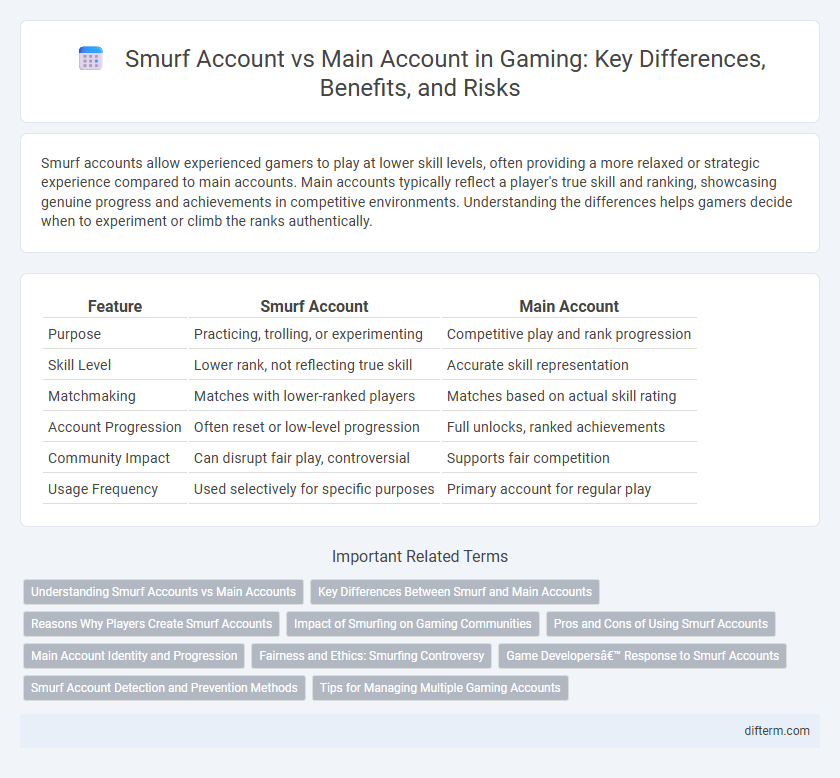Smurf accounts allow experienced gamers to play at lower skill levels, often providing a more relaxed or strategic experience compared to main accounts. Main accounts typically reflect a player's true skill and ranking, showcasing genuine progress and achievements in competitive environments. Understanding the differences helps gamers decide when to experiment or climb the ranks authentically.
Table of Comparison
| Feature | Smurf Account | Main Account |
|---|---|---|
| Purpose | Practicing, trolling, or experimenting | Competitive play and rank progression |
| Skill Level | Lower rank, not reflecting true skill | Accurate skill representation |
| Matchmaking | Matches with lower-ranked players | Matches based on actual skill rating |
| Account Progression | Often reset or low-level progression | Full unlocks, ranked achievements |
| Community Impact | Can disrupt fair play, controversial | Supports fair competition |
| Usage Frequency | Used selectively for specific purposes | Primary account for regular play |
Understanding Smurf Accounts vs Main Accounts
Smurf accounts are secondary gaming profiles created by experienced players to compete at lower skill levels, often to gain advantages or play anonymously. Main accounts typically reflect a player's true skill and progression within a game, maintaining ranks, achievements, and reputation. Understanding the differences between smurf and main accounts helps in addressing gameplay balance and community fairness issues in competitive gaming.
Key Differences Between Smurf and Main Accounts
Smurf accounts in gaming are secondary profiles created to play at lower skill levels, often allowing experienced players to dominate less skilled opponents, whereas main accounts represent a player's primary skill level and progression. Key differences include account ranking, experience points accumulation, and matchmaking impact, with smurf accounts typically having lower ranks but skilled gameplay, which can lead to unfair matches. Main accounts usually maintain consistent skill-based matchmaking and accurate representation of a player's abilities and achievements.
Reasons Why Players Create Smurf Accounts
Players create smurf accounts primarily to experience lower-skill matchmaking, allowing them to play casually without affecting their main account's rank or statistics. Smurf accounts also enable seasoned gamers to experiment with new strategies, characters, or roles in a less competitive environment. Privacy concerns and avoiding long queue times on highly ranked servers further motivate the use of smurf accounts in gaming communities.
Impact of Smurfing on Gaming Communities
Smurf accounts undermine fair competition by allowing experienced players to dominate lower skill brackets, leading to frustration and decreased enjoyment for genuine newcomers. This practice distorts matchmaking algorithms, resulting in imbalanced games and longer queue times, which degrade the overall gaming experience. Persistent smurfing can erode community trust and drive away casual players, ultimately harming the sustainability of online multiplayer ecosystems.
Pros and Cons of Using Smurf Accounts
Smurf accounts allow experienced gamers to play at lower skill levels, providing a more relaxed and less competitive environment, but they often disrupt matchmaking balance and degrade the gaming experience for genuine lower-ranked players. These accounts can serve as effective tools for practicing new strategies or heroes without penalty to the main account's ranking, though their use may be considered unethical or against terms of service in some games. While smurfing offers anonymity and a fresh start, it risks bans and community backlash, highlighting the trade-off between convenience and fair play.
Main Account Identity and Progression
Main accounts represent a player's true identity and reflect their authentic skill level, ranking, and in-game achievements, fostering a consistent and meaningful progression. These accounts accumulate experience points, unlock rewards, and maintain a reputation within the gaming community, making them central to long-term player development. Preserving the integrity of the main account ensures competitive fairness and encourages genuine engagement with the game's content.
Fairness and Ethics: Smurfing Controversy
Smurf accounts undermine fairness by allowing experienced players to dominate less skilled opponents, skewing matchmaking and detracting from genuine competitive balance. This practice raises ethical concerns as it disrupts the integrity of gameplay and frustrates new or casual players striving for progression. Game developers often discourage smurfing to maintain equitable environments and promote honest skill development within their communities.
Game Developers’ Response to Smurf Accounts
Game developers implement measures such as automated detection algorithms and strict account verification to curb smurf accounts, aiming to maintain fair matchmaking and competitive integrity. Many games introduce penalty systems including temporary bans or rank resets to discourage smurfing and promote genuine skill-based progression. The continuous update of anti-smurf policies reflects developers' commitment to enhancing player experience and preserving balanced gameplay environments.
Smurf Account Detection and Prevention Methods
Smurf account detection leverages behavioral analytics, including unusual skill discrepancies and inconsistent play styles compared to main accounts, to identify disguised players. Machine learning algorithms analyze gameplay metrics such as reaction times, kill-death ratios, and movement patterns to flag potential smurfs. Prevention methods integrate account verification protocols, matchmaking adjustments, and real-time monitoring to maintain fair competition and reduce smurf-related disruption.
Tips for Managing Multiple Gaming Accounts
Efficient management of multiple gaming accounts requires distinct strategies to avoid penalties and enhance performance, such as using separate email addresses and unique usernames for each account. Implementing dedicated hardware or virtual machines can prevent cross-account bans and maintain account integrity. Regularly updating account security settings and tracking progress independently ensures a seamless experience between smurf and main accounts.
Smurf Account vs Main Account Infographic

 difterm.com
difterm.com